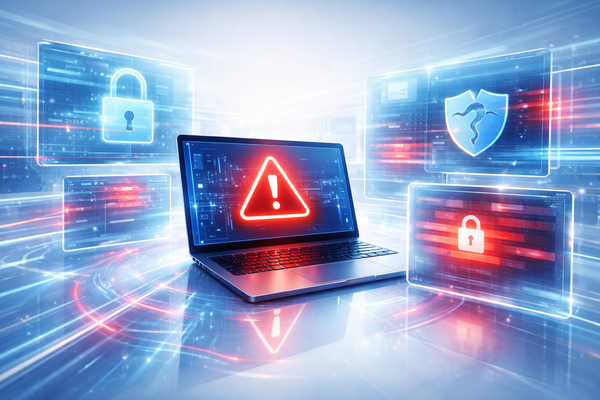Beware the Gavel: Unmasking Jury Duty Scams and Shielding Your Rights

Nowadays, cybercriminals' ingenuity and cunning are boundless. They adapt and evolve to exploit every facet of our daily lives. They have even turned their sights on a cornerstone of civic responsibility—jury duty.
Weaponizing legal obligations that come with a jury summons is not surprising, considering that threat actors have historically crafted intricate scams that not only deceive but strike at the very trust we place in various entities.
What Are Jury Duty Scams?
Jury duty scams are a type of psychological manipulation in which threat actors exploit the fear of legal consequences to deceive unsuspecting individuals. Our detailed guide aims to explain the nature of these scams, helping you better understand, detect and avoid them.
In this scam, perpetrators masquerade as court officials or police to intimidate victims into divulging sensitive information or paying fictitious fines. Victims who refuse to comply with the fictitious jury summons are threatened with legal action, including arrest or fines.
Understanding the Scam Mechanics
Scammers have fine-tuned their strategies to capitalize on the confusion and fear surrounding legal obligations like jury duty.
This section examines the intricate mechanisms of jury duty scams, uncovering the techniques perpetrators use to impersonate authority figures and exploit communication technologies to appear legitimate.
- Impersonation Techniques: Scammers rely on sophisticated spoofing technology to obfuscate their contact information, making it look legitimate. Perpetrators mimic phone numbers from genuine government offices or law enforcement agencies to lend credibility to their claims.
- Psychological Warfare: Perpetrators design their scam to create a high-pressure situation, appending a sense of urgency, prompting the victim to act hastily, driven by fear of legal repercussions.
- Monetary Demands: Usually, the scammer directs the victim to resolve the fabricated issue by immediate payment. The con artists often demand payment through untraceable methods, including digital wallets (crypto), prepaid cards, or wire transfers.
- Information Phishing: Instead of money, or in addition to it, scammers may seek personal information about the victims, leading to potential fraud or identity theft situations.
Detailed Detection Tips
Knowing how to distinguish legitimate legal communications from fraudulent scenarios is crucial to avoid falling victim to a jury duty scam. These practical, detailed tips can help you identify red flags and other suspicious behavior in supposedly official communications.
Learning to spot signs of scam attempts, including scammers’ specific language, inconsistency in calling times, and unusual methods of payment they propose, could help you confidently question and verify the legitimacy of unexpected jury duty notifications.
- Verify Official Communications: Genuine jury duty notifications are always mailed to citizens; authorities never issue jury duty summons via unsolicited phone calls, texts, or emails. Always cross-verify any unexpected communication with official court websites or directly through verified contact numbers.
- Beware of Scare Tactics: Recognize the language scammers often use to create a false sense of urgency. Official agencies never pressure individuals to hand out sensitive data, make immediate payments, or threaten abrupt legal action without due process.
- Question Payment Methods: Scammers often want payment through means that are harder to trace, including gift cards or cryptocurrency. Remember that no legitimate entity will demand court fines be paid via prepaid cards or crypto assets; if someone suggests such payment methods, it is a clear indicator of fraud.
- Suspicious Requests for Personal Information: Court officials will never ask for personal details or financial information over the phone, text, or email. If you’re asked for these details over the phone, text, or email, it could be a sign that you’re about to get scammed.
Preventive Measures
Prevention is one of your strongest weapons against jury duty scams and similar attempts at deceit. We’ve prepared a series of strategies designed to fortify your defenses, boost your digital security, and educate your community.
From adopting robust personal data protection practices to fostering a culture of skepticism surrounding unsolicited legal threats, these measures can significantly improve your odds of dodging these scams.
- Educational Awareness: Staying informed about the latest scam tactics can go a long way in keeping yourself safe. Government websites like the Federal Trade Commission (FTC) provide frequent updates and alerts on scam strategies, which are crucial in staying a step ahead of fraudsters.
- Critical Assessment of Communication: Always verify any unsolicited communication claiming to come from a court or law enforcement agencies—crosscheck if possible. Official jury duty notices are sent by physical mail, not email, text message, or phone.
- Use Dedicated Scam Detection Tools: Scamio is a dedicated scam detection tool that helps detect scam attempts in real time by analyzing suspicious links, messages, emails, images, and QR codes, then determining their legitimacy using artificial intelligence (AI). It’s easily accessible via web browser, WhatsApp, or Facebook Messenger, and requires no installation, making it a convenient tool for instant scam detection.
- Verify Caller ID Claims: Be skeptical of caller ID, as threat actors often rely on spoofing technologies to mimic legitimate numbers. If you receive a call from someone claiming to be a court official, hang up, look up the court’s number on its official website, and call it to confirm the claim.
- Protect your Personal Information: Never provide personal or financial information by the phone or email to someone who contacts you unexpectedly, especially if the person’s demands seem hasty or involve urgency. Always initiate contact through verified channels if you need to share sensitive information.
- Community Engagement: Share knowledge about scams and prevention methods with your friends and family. Educating your community can help prevent others from falling victim to these scams.
Conclusion
While jury duty scams are a formidable challenge in our digital age, exploiting fear and respect for the law, they are not impossible to detect.
Understanding their workings, recognizing the tell-tale signs, and taking proactive measures can help protect yourself and your communities from these deceitful threats.
Stay informed, stay skeptical, and remain vigilant in your interactions to safeguard against these invasive scams and their perpetrators.
FAQ
- How can I identify a jury duty scam?
Jury duty scams often involve a caller who masquerades as a police officer or court official, telling you that you’ve missed jury duty and threatening legal consequences. Most frequently, scammers threaten their victims with arrest unless they pay a fine immediately, and the suggested payment method is almost always untraceable, including gift cards or cryptocurrency. Genuine jury communications are always mailed, not phoned, texted or emailed. Furthermore, no court will ever demand immediate payment or sensitive personal details over the phone.
- What should I do if I receive a suspicious call or message about jury duty?
If you receive a message or a call that you suspect is part of a jury duty scam, hang up immediately and contact the court clerk’s office directly using a number you find through official channels to verify any claims. A good practice would be to report the incident to local authorities or the Federal Trade Commission (FTC) to help curb further scam attempts.
- Are there particular signs that a communication might be a jury duty scam?
Yes, there are specific signs that perpetrators may try to use fake jury duty summons to scam you. The scammer may spoof a real court or law enforcement phone number to make it appear legitimate on your caller ID. Always hang up and double-check by contacting the court clerk’s office yourself to verify the claims. Scammers may also create a sense of urgency to pressure you into acting quickly, often threatening arrest or huge fines. Remember, genuine jury duty notifications provide ample time to respond, and any legitimate issues can be verified directly with the courts.
tags
Author
Vlad's love for technology and writing created rich soil for his interest in cybersecurity to sprout into a full-on passion. Before becoming a Security Analyst, he covered tech and security topics.
View all postsRight now Top posts
Cybercriminals Use Fake Leonardo DiCaprio Film Torrent to Spread Agent Tesla Malware
December 11, 2025
Genshin Impact Scam Alert: The Most Common Tricks Used Against Players
December 05, 2025
How Kids Get Automatically Added Into WhatsApp Groups with Horrific Imagery Without Consent
November 24, 2025
FOLLOW US ON SOCIAL MEDIA
You might also like
Bookmarks









